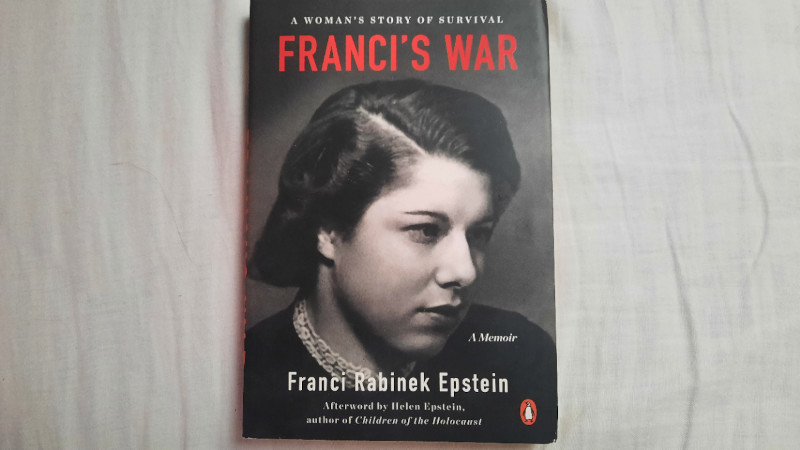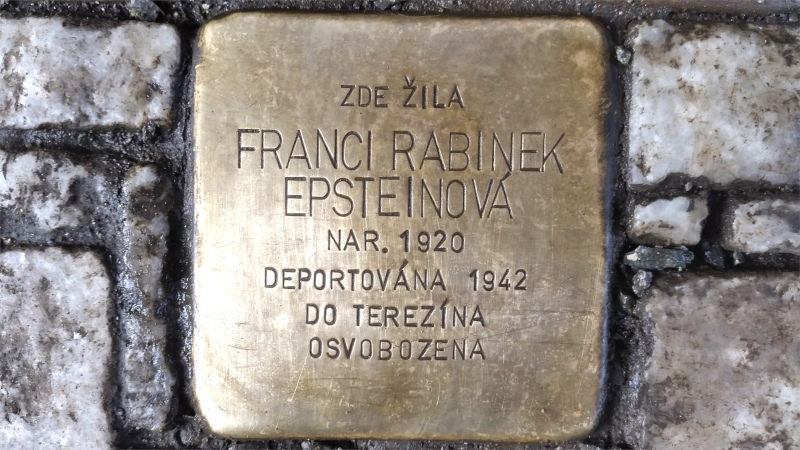Book Review – Franci’s War
Ten years ago I first wrote about Stolpersteine in Prague. Four years ago I met Gunter Demnig the man who ran the project and so I wrote about them again. Two years ago a friend published a book about the 460 Stolpersteine that were in Prague at the time so I wrote about them for a third time. Only 5 people out of the 460 memorialised had survived so I was curious how Franci Rabinek Epstein made it when millions of others perished. Fortunately she recorded her past experiences for us to read in her memoir Franci’s War before her sudden death in 1989.

Franci’s War – A Woman’s Story of Survival
If you think this is another “Jewish person who survived Auschwitz” story then think again. When I first bought the book I thought I was going to be reading about the effects on the Jewish community after the Nazi’s annexed the country in 1939 which turned out to be true but it came as a shock that in the pre-war part you learn that of the three main characters, one was Catholic, one was agnostic and the third was Franci Rabinek who although baptized as Catholic would become listed as “without religious affiliation”. The family, although not practising Jews, were caught in the Jewish racial net cast by the Nazis i.e. they had two grandparents who were Jewish.
The arrival at Auschwitz changes how you read the book. You’ll notice that for this entire period Franci Rabinek stops using the first-person “I” and begins to write in the third-person using her tattoo number A-4116. She uses the end of the Bergen-Belsen period to educate us. When the British liberated the camp they found the thousands of corpses that had to be identified and buried yet a few weeks later the US Army took over control thinking it was some kind of hospital/quarantine place for people with Typhus so their view of the camp was vastly different to the British. Franci’s War touches on many subjects not least the feeling that you are in the middle of some Stanford Prison Experiment mixed in with Stockholm syndrome, how an ethnic group can be systematically removed from a population and the choice that people make either to be a friend or to survive. It also touches on the kind of support people could get post-war, the obstacles that had to be overcome and hence why so many Holocaust survivors chose to emigrate.

But most of all you learn how luck plays an essential part in survival. Luck in when or where you were deported, being the right age, the right sex, in the right place at the right time with the right skill. It turns out being strong or intelligent does not guarantee your survival. Finally you’ll learn why it took 45 years between the recording of the memoir and it’s publication.
I bought the book because of the connection to Prague and my own personal interest in Prague Stolpersteine. I found it a compelling read not least because I know the Prague locations but even without that knowledge it’s a fascinating look at “human character”, the survival of both body and mind, the ability to forgive people but not a country.
Penguin ISBN 978-0-14-313557-9
Something Related or a Few Minutes Away
Inspirational – Prague Stolpersteine
Inspirational – Terezin Ghetto Editors
Book Review – Prague’s Stolpersteine: Defiant in their Memory
Book Review – Out of the Midst of the Fire
Book Review – Via the Left Bank of the 90s
History/WW2 – Protectorate of Bohemia and Moravia
Art and Culture – Spitfire Butterflies
Activity – Old Town and Jewish Quarter Hidden Secrets
Services – Quadrio Shopping Centre
